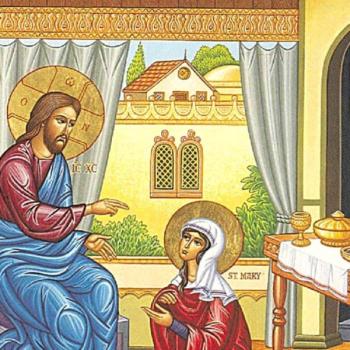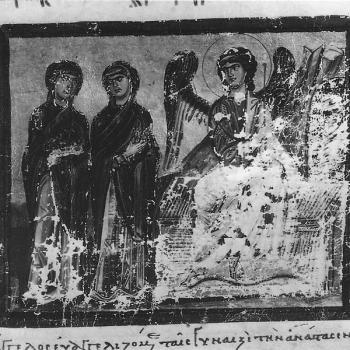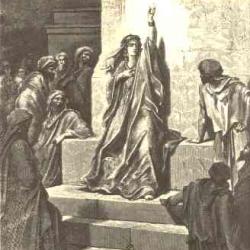It’s not a secret to say the issue of women in ministry may be one of the most decisive present throughout church history. It continues to be a topic of controversy, no matter the evidence that speaks for itself. While current statistics cite that more than seventy percent of Evangelicals support public ministry roles for women, seeing women in top church leadership roles remains relatively rare. This is true across a number of major Christian denominations, notwithstanding entire denominations, such as Roman Catholicism and the Churches of Christ, that reject female leadership entirely. Adding to this list, the Southern Baptist Convention recently decided to remove all female-led churches from its association.
Biblical women in ministry
Many reject the idea of women in ministry because they feel it’s not present in the New Testament. To the contrary, there are a number of female leaders present in the New Testament. In learning doctrine before we read Scripture, we sometimes overlook these women. It’s not uncommon to skip passages that don’t support what we are led to believe. We see the text but read around it, assuming it must mean something other than what seems obvious.
This is truer nowhere more than when it comes to women in leadership. It’s not possible to read the Bible objectively, with no doctrinal formation, and conclude the Bible has a singular statement against women’s ordination. Scripture provides examples of women in leadership positions, serving as:
- Old Testament prophetesses
- Mothers and wives to kings in power (historical positions of influence)
- Church leaders of various stature, including deacons, pastors (as churches met in their homes), and apostles
Female apostles present in the New Testament
Here, we are going to look at four overlooked New Testament women who served as apostles in the early church. For those unfamiliar with the term “apostle,” it refers to a church leader interested in the structure and development of congregations and other Christian leaders. The word “apostle” means “sent one.” This title tells us what apostles do, in one sentence: build the church through travel and communication with Christian communities in different regions.
Mary Magdalene

Mary Magdalene went to the disciples with the news: “I have seen the Lord!” And she told them that He had said these things to her. (John 20:18, NIV)
I’ve said if there is one woman the church owes an apology, it is Mary Magdalene. Like most New Testament figures, we don’t know a lot about her. We do accept, however, that she was a real person, mentioned by name twelve times in the canonical Gospels. She’s unique, as her identity is connected to her location of origin (Magdala) rather than her family name. What this means, we don’t know. It probably means she was well-known.
Her essential work as a woman in ministry
The Bible tells us Mary Magdalene supported Jesus of her own means along with a group of other women, thus indicating she was probably wealthy. She had seven demons cast out of her. She stayed with Jesus, through to the crucifixion. After, she was a witness to the burial, and resurrection of Jesus. Formally known as the “Apostle to the Apostles,” she was the first to proclaim the resurrection of Jesus. She was as an early church leader, working with the Apostle John in Ephesus.
In 591, Gregory I preached an Easter sermon portraying Mary Magdalene as a “promiscuous woman.” From that point, legends about Mary Magdalene have flourished. Popular myths include:
- A prostitute
- A royal, wealthy heiress
- Mother of Christ’s child
These stories make for great fiction, but the rumors still prove people would rather believe the lie that women are good for nothing but sex or motherhood. Mary Magdalene was much more than either one, and upholding her leadership role is essential to restoring her dignity as an apostle of the Lord.
Photini
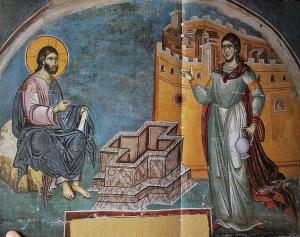
Many of the Samaritans from that town believed in Him because of the woman’s testimony, “He told me everything I ever did.” So when the Samaritans came to Him, they urged Him to stay with them, and He stayed two days. And because of His words many more became believers. They said to the woman, “We no longer believe just because of what you said; now we have heard for ourselves, and we know that this Man really is the Savior of the world.” (John 4:39-42, NIV)
Are you scratching your head right now, trying to find the name “Photini” in Scripture? No, it’s not your imagination. You don’t know this Biblical woman by her name, but rather, her story. More commonly known as “the woman at the well,” Photini (meaning “light bearer”) has a rich history that doesn’t quite align with modern portrayals of her.
Setting her ministry record straight
Most know Photini because, according to the text, she was married five times and lived with a man without benefit of marriage. Modern interpretations raise social and moral inuendos found nowhere in the next. The Greek word for “man” in the passage literally just means “a man” and it could refer to:
- A male relative
- She was a caretaker for an ill or elderly man
- He was a roommate
- She was in a betrothal period, discerning future marriage
- She was living as a concubine
In reality, Samaritans were the original “purity culture.” She, most likely, lived with multiple husbands due to Levirate marriage. It’s unlikely she lived with a sexual partner outside of marriage, as some do in modern times. Identifying her as a “morally loose woman” (using any number of epithets) disregards the truth of her ministry in the first century.
A woman in ministry who was the original apostle to the Gentiles
Photini was the first apostle to the Gentiles. Her first converts were her five sisters and two sons, all of whom went on to work in ministry. She worked as an apostle in Carthage for over 30 years, later joining her son in Rome. A group of Christians were arrested during Nero’s persecution with signs and miracles following the imprisoned. Photini joined them, also witnessing a number of miraculous events that either freed the confessors or delayed their deaths. When asked to reject Christ and sacrifice to idols, she replied with “O most impious of the blind, you profligate and stupid man! Do you think me so deluded that I would consent to renounce my Lord Christ and instead offer sacrifice to idols as blind as you?”
In response, Photini was thrown down a well, where she died in the year 66.
Junia
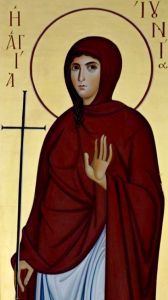
Greet Andronicus and Junia, my fellow Jews who have been in prison with me. They are outstanding among the apostles, and they were in Christ before I was. (Romans 16:7, NIV)
If you’ve never heard of the Apostle Junia, you aren’t alone. Most probably wouldn’t consider Romans 16:7 preaching material. Here, Junia is mentioned with many others praised by the Apostle Paul for their work in connection to the church in Rome. Junia is mentioned in connection with Andronicus. The text states they were of outstanding note among the apostles.
Who was Junia?
The relationship Andronicus and Junia had is of some debate. Some say they were a married couple in ministry together, some say they were biological cousins of the Apostle Paul, some speculate Junia was the Apostle Paul’s sister, and some say they were relatives of each another, but the evidence isn’t conclusive. What we do know: When you break down the Greek of this passage, it does state they were of outstanding note among the apostles because they were such themselves. This wasn’t a matter of just being great Christians, but standing as leaders of note among their colleagues. Junia, along with Andronicus, was known for spiritual work, excellent governance, and exemplary apostolic leadership.
A woman in ministry who walked with Christ
Junia’s history is part of early church record, confirming her apostolic work. She was one of the original seventy sent out by Christ Himself (she walked with Him during His earthly ministry). She and Andronicus traveled throughout Pannonia, a province of the Roman Empire that covered what is now western Hungary, Slovakia, eastern Austria, northern Croatia, northwestern Serbia, northern Slovenia, and northern Bosnia and Herzegovina. The two served as missionaries to the pagan communities present there and she was able to perform miracles, drive out demons, and heal the sick. According to church tradition, both she and Andronicus were martyrs.
Junia and the Bible
Junia’s presence in the Bible is a story of perseverance. As early as the thirteenth century, Aegidus of Rome referred to Junia and Andronicus as “those honorable men” without any particular explanation. Martin Luther also referred to the two as “men of note among the apostles.” In more modern history, Junia became “Junius” in the Nestle-Erwin Version of the New Testament in 1927. To compensate for this change, they added a footnote questioning her gender. In the 1979 Nestle-Aland text, Junia was changed to Junias, with removal of the footnote. In 1998, scholars took note, and made efforts to update older versions of modern translations, restoring Junia’s proper place.
Apphia
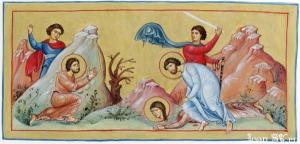
Paul, a prisoner of Christ Jesus, and Timothy our brother, To Philemon our dear friend and fellow worker— also to Apphia our sister and Archippus our fellow soldier—and to the church that meets in your home: Grace and peace to you from God our Father and the Lord Jesus Christ. (Philemon 1-3, NIV)
Apphia is another uncommon Bible figure. She is one of eighteen women mentioned by name in the Pauline letters. We can also find her in the Acts of Paul and Acts of Titus, early church apocryphal documents.
Her story as a woman in ministry
There are some theories that Apphia was Philemon’s wife, but the language used in the text doesn’t support this idea. If anything, the text indicates Apphia probably stood on her own. She might have been a missionary partner (a female co-worker in ministry). In modern times, we would classify her as a queerplatonic partner: someone who joins with another/others in a non-romantic relationship. In a New Testament sense, such would serve to proclaim the Gospel.
According to history, Apphia was an apostle, also numbered among the seventy sent out by Christ. The central church of Colossae was in her home, and she would minister from there. When the church gathered for prayer during a pagan feast, the home was raided by angry individuals who killed Archippus, Philemon, and Apphia.
In conclusion
These four women present different examples of female apostolic leadership in the early church. Each has a story beyond a few sentences in Scripture, long-held as part of church history. Their unique voices present differences in purpose, office, and work provides us powerful defense of the work and call of women in ministry. Far from being something new or innovative, it’s obvious women have served in church leadership from its very inception. In response, let’s do the following:
- Celebrate and support women who embrace the difficult call to ministry work
- Learn more about the work of women in ministry throughout history
- See ministry as a task larger than gender identity
As active contributors to the church, women in ministry have much to offer our communities of faith.





